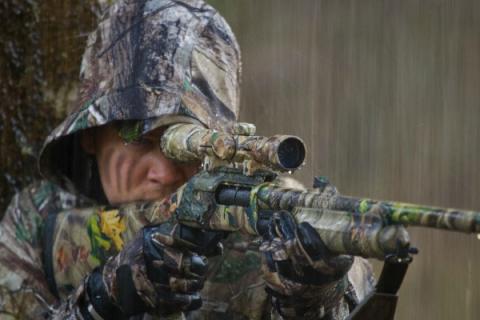
Picture the perfect spring turkey hunting day and it would be something like this: vivid blue skies, crisp air, and a hint of wind to keep the bugs at bay. Reality is rarely so kind. Instead, a typical spring turkey hunt might feature lightning, sleet, wind, or enough rain to drown a duck.
The good news is bad weather doesn’t mean bad hunting. The secret is to deal with it head on. Analyze the conditions, determine how they will affect turkey behavior, and adjust your strategy appropriately.
Here’s how to cope with six of the most common bad-weather scenarios:
1. Rain
 |
| Don’t let rain keep you at home. Choose calls carefully, invest in quality raingear, and wear a hat with a brim so you can see clearly. |
A mist or light sprinkle often has little effect on toms, and the damp woods can actually help you make a quiet approach into range. Wear quality raingear and a hat with a brim so you can see clearly. Also choose your calls carefully. Diaphragm calls are great since they stay in your mouth. Glass and aluminum models also work well in the rain. If you use push-pin calls, turn them upside down and shelter them with the palm of your hand. Try to stay away from slate and box calls, which often sound squeaky and perform poorly when wet.
If it’s pouring rain at sunrise, your best move is to wait it out. Turkeys rarely fly down early in heavy rain. If there’s a chance it will lighten up, hang out at camp or in your vehicle until then. When they do fly down, they’ll be particularly anxious to find a mate.
Gobblers don’t like roaming through woods and shrubbery getting their feathers drenched. That makes fields especially good spots to try. Toms will head there to shake the rain off and strut. Logging roads and natural meadows are also good spots for soaked birds to show off. Set out a hen or hen-jake decoy combo and get in position as soon as the rain stops.
2. Sleet
A sworn enemy of wild turkeys, sleet will weigh their feathers down and quickly rob them of body heat. Turkeys will stay on the roost if they are in conifers because of the protection offered. If their roost does not provide adequate protection from the elements, they’ll head for the nearest open evergreen stands at first light. Be there waiting.
3. Thunder & Lightning
Every year, nearly 100 people are killed by lightning in the United States. No gobbler is worth injury or death. If you’re caught outside when a storm erupts, seek safety in a vehicle or low-lying area immediately. If that’s not possible, stay away from tall trees and lay your gun down away from you.
While lightning is dangerous, they don’t call turkeys “Thunder Chickens” for no reason. That thunderous crash can be better than any locator call in your vest. Listen for toms from the safety of your vehicle or camp. As soon as the storm breaks, make a beeline to birds the thunder located for you.
 |
| A cold snap can cause gobblers to clam up for a few days. Stay in the woods later and remain patient when calling—a few hours in the smoker will warm that old tom right up. |
4. Cold Snap
Turkeys are hardy and cold doesn’t affect them much. However, if bitter temperatures arrive after it’s been mild, turkeys may be quiet for a day or two as they adjust to the change. Much like hunters on cool mornings, turkeys prefer to sleep in and may delay flying down from the roost. Stay in the woods later in this situation, and remain at each location a bit longer, trying several different calls.
5. Heat Wave
A spike in temperature can also slow gobbling activity. As with cold weather, the change bothers them more than the temperature itself. Gobblers will often sound off at sunrise, during the coolest part of the day. Move quickly to birds you’ve located and work them aggressively. They may clam up within a half hour.
If you don’t have any luck at first light, set up near streams and ponds. The birds will travel to water when it’s hot and dry. Call sparingly at these spots. Also check out shaded draws, ridges with cooling breezes, and conifers that offer some relief from the heat.
6. Extreme Wind
Spring is notorious for windy weather. The flapping branches and rustling leaves make gobblers wary. Roost the birds the night before if possible, or locate them in the pre-dawn with owl calls. Take advantage of any calm at first light and move in quickly.
No, bad weather doesn’t mean bad hunting. You simply have to adjust your strategy and location to the conditions. When you do score in wretched weather, the experience will be etched in your memory for years to come.
- 27027 views

